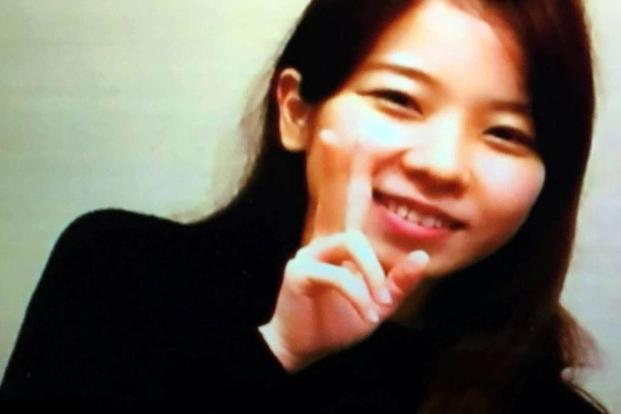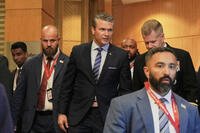NAHA CITY, Okinawa -- The parents of a 20-year-old Okinawan woman murdered last year told a packed courtroom Friday they want the former Air Force contractor charged in her death to pay for the brutal crime with his life.
"A murderer, who took my daughter's life, should not be allowed to live," the mother said in a statement read by her lawyer during the second day of Kenneth Franklin Gadson's trial at Naha District Court.
Gadson, 33, a former Marine who was a civilian employee at a Kadena Air Base cable and internet provider at the time of his arrest, is charged with murder, rape resulting in death and the illegal disposal of a body in the death of Rina Shimabukuro. He is being tried under Japan's lay judge system with three judges and six jurors.
Shimabukuro disappeared after going out for a walk on the evening of April 28, 2016. Gadson became a suspect -- and was later charged in the crime -- after police spotted his SUV while checking vehicles captured by security cameras in the area.
During the previous day's proceedings -- which mostly focused on whether Shimabukuro's killing was premeditated -- Gadson read a prepared statement pleading guilty to rape resulting in death and illegal disposal of the body but denied the murder charge, stating that he had "no plans to kill her."
Gadson told the court he planned to knock her unconscious, take her to a hotel in a suitcase to rape her and release her afterward. After failing to knock her out, he panicked and was not able to complete his plan, he said.
On Friday, Shimabukuro's father made it clear that the family wants capital punishment for Gadson.
"Please atone for [the crime] with your life," he said in a statement presented by prosecutors. "I want him to explain why my daughter had to be killed and why it was my daughter."
Gadson sat in the courtroom looking straight ahead as the parents' statements were read. He wore a white T-shirt, blue pants and black sandals as he did the first day of his trial on Thursday.
Gadson was twice given a chance to answer questions by both the defense and prosecution -- first in the morning and again in the afternoon -- but refused to speak.
"I choose to remain silent," he said, when asked if he had anything to say to the victim or to her family. Defendants who show remorse and apologize for their crimes sometimes receive lighter sentences under the Japanese justice system.
Prosecutors argued Thursday that Gadson approached Shimabukuro "with murderous intent," struck her with a metal stick, dragged her into the bushes, strangled her and then stabbed her with a knife to repress her.
However, Gadson did not actually go through with the rape after discovering that Shimabukuro was menstruating, they said. He then put her in a suitcase and drove to a wooded area in Onna Village to dump the body, using gardening soil prepared ahead of time to cover her remains.
The defense countered that Gadson did not stab Shimabukuro until after dumping her body, in an effort to check whether she was dead. They said Gadson did not strike and choke her with the intention of killing her.
During Friday's proceedings, Kenji Ninomiya -- the doctor who performed Shimabukuro's autopsy -- testified that a postmortem examination could not reveal the type of assault that caused her death, because decomposition was too advanced. Her body had been buried for nearly a month before Gadson pointed it out to police.
Ninomiya, answering questions from prosecutors, agreed that choking or stabbing are possible causes for Shimabukuro's death. The defense had previously argued that she hit her head hard on the ground when Gadson pulled her into the bushes, possibly killing her.
Ninomiya cast doubt on that argument.
"It is hard to think that one died from falling and hitting his or her head on a soft surface with dirt and grasses like these bushes," the doctor said after being shown a photo of the site where Shimabukuro was attacked.
While cross-examining Ninomiya, the defense pointed out that she could have hit her head on a hard object on the ground, such as a rock.
The brutal slaying shocked the Japanese and triggered massive anti-American protests on an island where half of about 50,000 U.S. troops in Japan are based. Then-President Barack Obama was forced to apologize for the crime during his historic visit to Hiroshima a month later, following a strong rebuke from Prime Minister Shinzo Abe.
Closing arguments are scheduled for Nov. 24, and a verdict is expected on Dec. 1.











